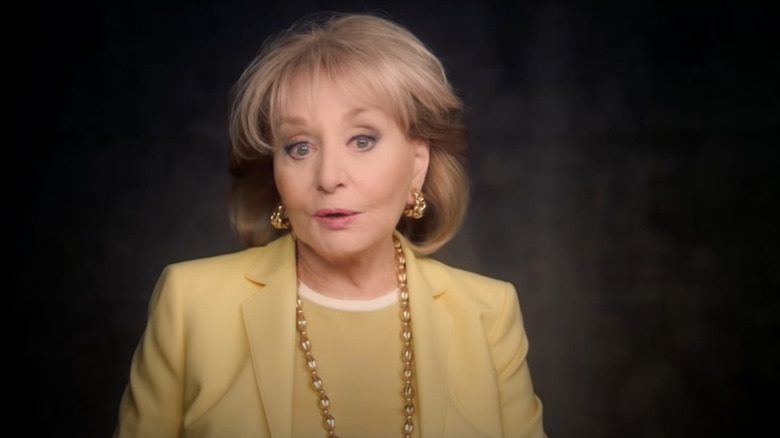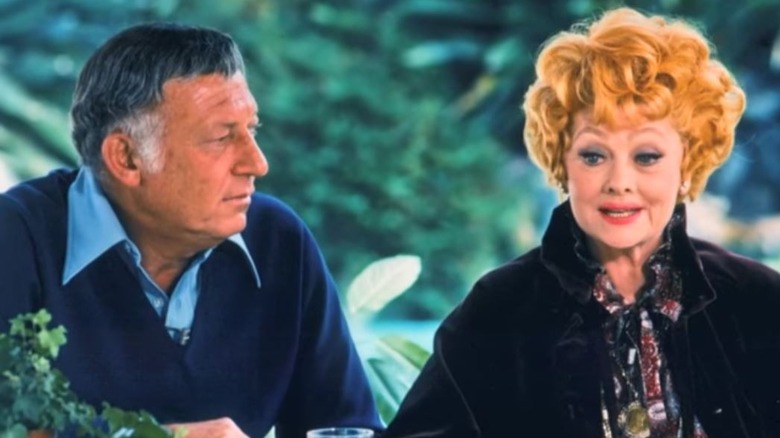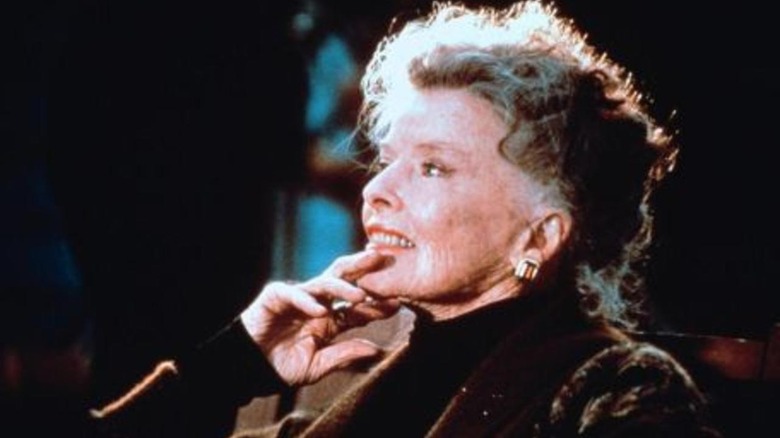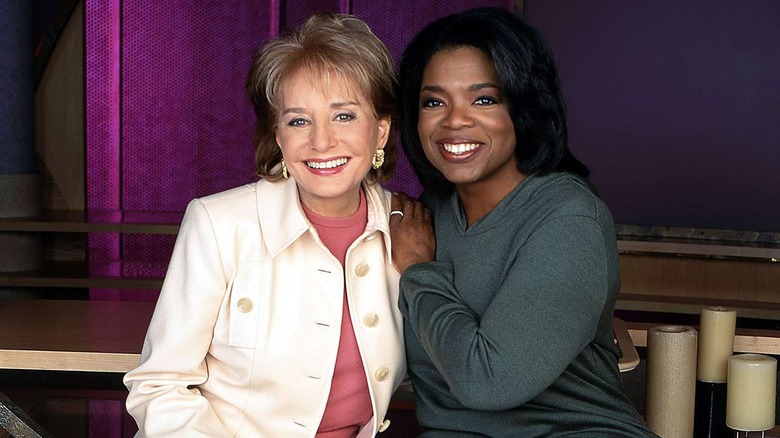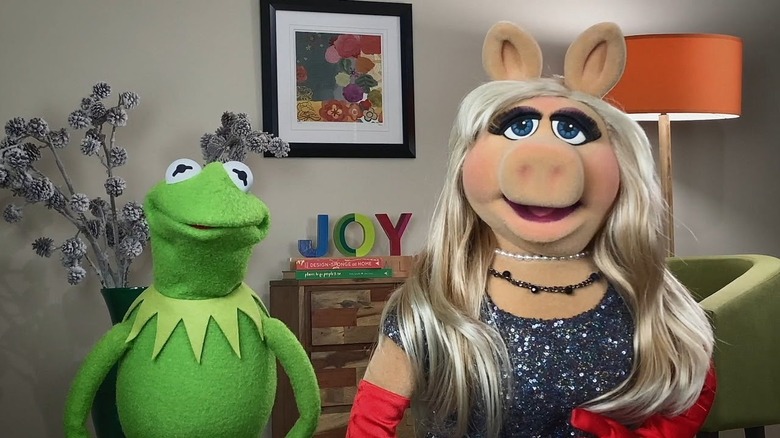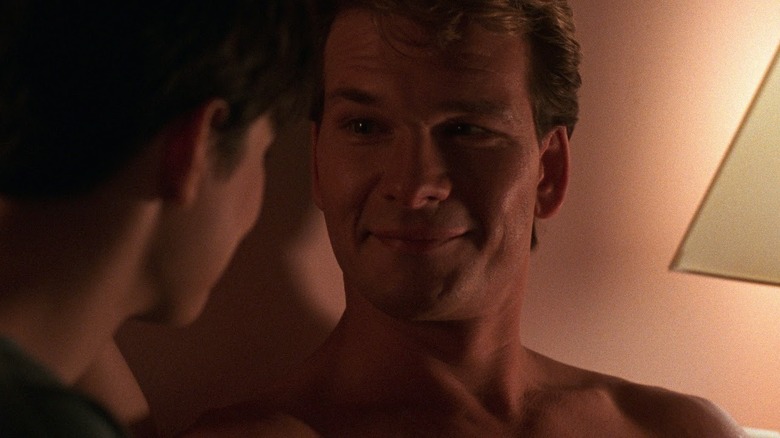Barbara Walters' Best Interview Moments From The World Of Movies
The world of journalism would not be what it is if not for the contributions made by Barbara Walters. The legendary journalist recently passed away, shining a new light on her decades of interviewing everyone from world leaders to those involved in celebrity sex scandals. While Walters has rightfully come under fire for moments in which she pushed a little too hard or attempted to silence the voices of people crying out to be heard, her legacy is undeniable. The way that interviews are conducted by journalists across the globe has been modeled after Walters, with everyone from Diane Sawyer to even conspiracy-theory-peddling wackos with podcasts all emulating her style. As we look back at the over a half-century of interviews conducted by Walters, a handful of intimate discussions with some of Hollywood's biggest stars represent some of her best work. A staple of pop culture herself, Walters often connected with even the toughest and tight-lipped performers, allowing them to show a level of vulnerability never before seen. Here are five of her most memorable.
Lucille Ball
Thanks to the endless reruns of "I Love Lucy" available at any given moment, Lucille Ball is one of the great Hollywood actors that is frozen in time in our memories. Hearing her name transports us all to a black-and-white vision of the animated comedienne with the big eyes and an even bigger laugh, which is why Barbara Walters' 1977 interview with Ball and her husband Gary Morton is such a strong interview. Walters prodded a bit in trying to get Ball to talk about her breakup with Desi Arnaz, but Ball was unafraid to push back on the famed interviewer. She was frank as hell about her previous marriage, telling Walters, "I married a loser. He could win, win, high stakes. He worked very hard, but he had to lose. Everything he built, he had to break down. He still claims he's the same way."
The Lucille Ball interview marks a very important time in Barbara Walters' career, as this is the same year she landed a joint interview with Egypt's president, Anwar Al Sadat, and Israel's Prime Minister, Menachem Begin, which arguably solidified Walters as one of the greatest living journalists. As intimidating as a political figure might be, talking to a living legend like Lucille Ball is arguably even more stressful. When the interview was replayed years later as part of the "Interviews of a Lifetime" collection, Walters admitted, "when I interviewed Lucille Ball, I was nervous." Considering Walters' legacy as a ferocious interviewer, seeing her work through nerves is a fascinating watch.
Katharine Hepburn
In one of Barbara Walters' most memorable interviews, she spoke with Hollywood icon, Katharine Hepburn. Much of the interview's legacy is tied up with Walters' famous snafu of asking Hepburn, "If you were a tree, what kind of tree would you be?" The famed interviewer recognized what a ridiculous question it was during her special "30 Mistakes in 30 Years," where she gives the advice to never ask someone what kind of tree they would be.
However, the rest of the interview from 1981 is absolutely fascinating. Hepburn was a bit of a recluse in her later years, becoming fiercely protective of her private life. And yet, Walters was able to get Hepburn to talk, and much of their discussion was centered on the idea of women "having it all" in Hollywood. Hepburn famously never had children and tells Walters it's because she felt it would have been impossible to be a mother and have the career she wanted.
This is also the interview where Hepburn tiptoed around issues of sexuality and gender identity. "We're very confused, sexually. Very confused," she said. "I put on pants 50 years ago and declared a sort of middle road. I have not lived as a woman. I have lived as a man." She then said, "I've just done what I [...] wanted to and I made enough money to support myself and I ain't afraid of being alone."
Oprah Winfrey
Barbara Walters interviewing Oprah Winfrey is the interviewer equivalent of Michael Jordan sitting down with LeBron James to talk about basketball. This is Andre the Giant and Hulk Hogan at Wrestlemania III, or in movie terms, it's as if George A. Romero interviewed Jordan Peele. Oprah has said many, many times over the years that she owes her career to the glass ceilings shattered by Walters, even saying on social media following Walters' passing, "Without Barbara Walters there wouldn't have been me — nor any other woman you see on evening, morning, and daily news." Oprah had interviewed Walters in the past, but it was when the duo sat down on Walters' turf to have a very candid discussion that marked a moment of greatness.
In November 2010, Walters and Oprah sat down for a one-hour ABC News special, and despite decades of working as colleagues in the industry, Walters did not hold back. She probed Winfrey about the long-standing rumor that she is a lesbian with her longtime friend Gayle King. Winfrey vehemently denied the claims, but started to cry when talking about how much King means to her. "She is the mother I never had, the sister everybody should have and the friend that everybody deserves." Walters asks Oprah why talking about King makes her cry, to which she replies, "It's making me cry because of how much I never told her that." Oprah would later attend Barbara Walters' farewell episode on "The View" to tell her just how much she has meant to her over the years, bringing Walters to tears.
Kermit the Frog and Miss Piggy
Absolutely everything is better with Muppets, and that includes Barbara Walters' interviews. Walters has a long history with the Jim Henson company, having appeared on multiple "Sesame Street" specials, hosted the Sesame Workshop Benefit Gala in 2005, brought on Miss Piggy for multiple appearances on "The View," and Walters even has her own parody Muppet named Baa Baa Walters. However, it was during the ABC News' "20/20" Emmys special, "Best in TV: The Greatest TV Shows of All Time," that represents her very best interview with the most-famous celebrity couple in entertainment.
The special presented the results of a nine-category poll conducted by ABC News and People Magazine. For the "Best Non-Human Characters" category, Kermit the Frog took the top spot while Miss Piggy nabbed fifth place. Walters was always great when navigating the big personalities of Muppets, always treating the characters the same way she would any other human celebrity. She brought a level of respect and admiration to the two of them and discussed their relationship as if it were legally binding. It's also just a lot of fun to see Walters get to relax a little bit because she's talking to adorable Muppets, and not someone with access to nuclear codes. As prickly as she could be sometimes, she also had a big heart.
Patrick Swayze
I fully admit that I am biased in including this interview because Barbara Walters interviewing Patrick Swayze in 2009, the year he would pass away from pancreatic cancer, is something that is permanently etched into my memory. It is painfully and heartbreakingly clear that Swayze knew he was at the end of his life, but still found ways to be cheerful, optimistic, and playful while discussing his cancer treatment. This wasn't Walters' first time interviewing Swayze, and she makes a reference to their 1988 interview in which he started crying about his father's recent passing. He had said in that interview that his father viewed crying as a "sign of weakness," which only made it harder for Swayze to revisit. When the interview cuts back to the present, Swayze is noticeably misty-eyed, and refers to Walters as a "devil dog."
But it was when Walters played him in a clip from the film "Ghost," where Swayze's deceased character's spirit finally steps into the light and says, "It's amazing, Molly. The love inside, you take it with you," that finally broke him. It's the sight of a man accepting his fate, and being okay with saying goodbye. I was diagnosed with pancreatic cancer four years after this interview, and some of the folks on my medical team had consulted with Swayze's team the years prior. I watched this interview probably a hundred times during my treatment, and I'm fortunate enough to say that I'm still here. That interview changed my life, and likely made a massive impact on countless others who were forced to look death in the face.
